I have met or interviewed (or both) five head football coaches at my alma mater, the University of Texas: Darrell Royal, Fred Akers, David McWilliams, John Mackovic and Mack Brown. I draw your attention to the fourth of those gentlemen, Mackovic. Our lone encounter took place underneath the stands at the Erwin Center in 1992, where UT was hosting some Southwest Conference team in basketball. He would be introduced at halftime, and he graciously gave me an interview for my soon-to-be-published book, “For Texas, I Will” / The History of Memorial Stadium.
Mackovic, a three-sport star in Barberton, Ohio, was not highly recruited. The only reason he got a scholarship offer is that an assistant coach at Wake Forest, Dick Hunter, came from Barberton (as did Bo Schembechler) and knew of him. He traveled 375 miles almost due south to Winston-Salem, North Carolina and soon proved he could play. In addition to his athletic skills, he was a leader. Starting quarterback on the freshman team, he roomed with Brian Piccolo, a running back from Fort Lauderdale, Florida. Not a blue-chipper either, he got two scholarship offers. Yet Mackovic and Piccolo were a vital part of the 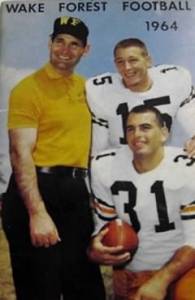 Demon Deacons’ offense between 1962 and 1964. Wake Forest, a member of the Atlantic Coast Conference, has never been, is not and never will be among the elite in college football. The ’62 season was rather challenging as the black and gold had an 0-10 record, scoring just 66 points. Coach Billy Hildebrand’s team went 1-9 the next year, with a single one-point victory over South Carolina. They suffered six shutouts (including 47-0 to Army, 36-0 to Clemson and 42-0 to NC State) and managed to score but 37 points. Thirty-seven points in an entire season! By most metrics, they were the worst team in major college ball. It was considerably better in 1964 though. Bill Tate had been brought in and apparently provided some much-needed direction. Wake Forest’s 5-5 record surprised a lot of people. Mackovic and Piccolo were both all-ACC; Piccolo led the nation in rushing and scoring, finishing tenth in Heisman Trophy voting.
Demon Deacons’ offense between 1962 and 1964. Wake Forest, a member of the Atlantic Coast Conference, has never been, is not and never will be among the elite in college football. The ’62 season was rather challenging as the black and gold had an 0-10 record, scoring just 66 points. Coach Billy Hildebrand’s team went 1-9 the next year, with a single one-point victory over South Carolina. They suffered six shutouts (including 47-0 to Army, 36-0 to Clemson and 42-0 to NC State) and managed to score but 37 points. Thirty-seven points in an entire season! By most metrics, they were the worst team in major college ball. It was considerably better in 1964 though. Bill Tate had been brought in and apparently provided some much-needed direction. Wake Forest’s 5-5 record surprised a lot of people. Mackovic and Piccolo were both all-ACC; Piccolo led the nation in rushing and scoring, finishing tenth in Heisman Trophy voting.
Most of Mackovic and Piccolo’s teammates were southern “white boys,” unaccustomed to interracial competition. These two were not, however, and they welcomed a more open and fair setting. Let’s go back to 1963. Maryland was visiting Bowman Gray Stadium (which doubled as a venue for stock car racing and, in its early years, horse racing) for a scheduled ACC game, and one of the Terrapins was black, receiver Darryl Hill. Before kickoff, as fans hurled racist taunts at him, Piccolo came over, put his hand on Hill’s shoulder and offered tangible support. (Pee Wee Reese had done much the same with his Brooklyn Dodgers teammate Jackie Robinson in a tense game in 1947.) Oh, but that’s not all. Tate, AD Gene Hooks, school president Harold Tribble and the Board of 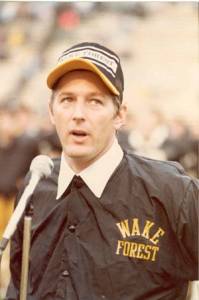 Trustees were in accord that old man Jim Crow had to go. It was time to integrate the football team. Mackovic and Piccolo were asked to help when Robert Grant, Kenneth Henry and William Smith were being recruited for the 1965 Wake Forest team. It was a difficult and sensitive situation, one they handled well.
Trustees were in accord that old man Jim Crow had to go. It was time to integrate the football team. Mackovic and Piccolo were asked to help when Robert Grant, Kenneth Henry and William Smith were being recruited for the 1965 Wake Forest team. It was a difficult and sensitive situation, one they handled well.
Both went undrafted by the AFL and NFL. Mackovic’s playing career was over, but Piccolo signed a free agent contract with the Chicago Bears. He fought his way to a starting position in the backfield alongside the great Gale Sayers. In a 1969 game against the Atlanta Falcons, he scored a 1-yard touchdown run and then told the team doctor he was having trouble breathing. Mackovic’s former roomie was soon diagnosed with carcinoma and 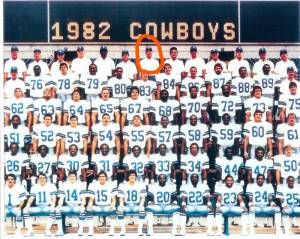 died in the summer of 1970 at age 26.
died in the summer of 1970 at age 26.
Mackovic was not twiddling his thumbs in those years. He earned a master’s degree from Miami University and coached at West Point, San Jose State, Arizona and Purdue. He finally got a head coaching gig in 1978, at Wake Forest. A 1-10 record his first year must have brought back memories of 1962 and 1963. But guess what—Mackovic’s Deacons went 8-4 the next season, for which he was justifiably named ACC coach of the year. By 1981, he 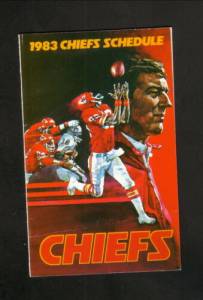 had made a big step. Tom Landry of the Dallas Cowboys must have seen something in him as he served as an assistant for two years. Maybe Landry gave Lamar Hunt a strong recommendation because Mackovic was named head coach of the Kansas City Chiefs in 1983. He lasted four seasons, had a 30-34 record and got into the playoffs once. It ended weirdly because of an overexuberant assistant coach named Frank Gansz.
had made a big step. Tom Landry of the Dallas Cowboys must have seen something in him as he served as an assistant for two years. Maybe Landry gave Lamar Hunt a strong recommendation because Mackovic was named head coach of the Kansas City Chiefs in 1983. He lasted four seasons, had a 30-34 record and got into the playoffs once. It ended weirdly because of an overexuberant assistant coach named Frank Gansz.
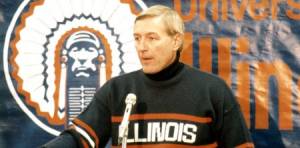 By 1988, Mackovic would have a new home—Champaign, Illinois. He served as coach and AD of the Illini for four years. A somewhat stronger foundation than he’d had at Wake Forest, Illinois was nevertheless a struggling program. He went 30-16-1, put his team into four bowl games, finished No. 10 in 1989 and won a share of the 1990 Big 10 title.
By 1988, Mackovic would have a new home—Champaign, Illinois. He served as coach and AD of the Illini for four years. A somewhat stronger foundation than he’d had at Wake Forest, Illinois was nevertheless a struggling program. He went 30-16-1, put his team into four bowl games, finished No. 10 in 1989 and won a share of the 1990 Big 10 title.
UT, if I may say, was a somewhat larger stage than Illinois. It was in the heart of football country, the facilities were better, and the money was better. Why shouldn’t he go? How well I remember the end of the McWilliams era in Austin. DeLoss Dodds, athletic director at Texas, wanted Mackovic and brought him on board—leading to our brief interview at the Erwin Center. He had highs and lows, as is usual in the volatile world of college football. There were fierce clashes with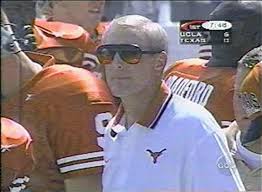 Oklahoma in the Cotton Bowl, one Big 12 coach of the year award, a loss to Virginia Tech in the Sugar Bowl, an upset of two-time national champ Nebraska, a mortifying loss to Rice and a sideline concussion and lacerated chin against Colorado when UT defenders Tony Brackens and Tre Thomas collided with him. And let’s not forget that Mackovic convinced a San Diego running back named Ricky Williams to don orange and white. His six-season reign effectively ended when UCLA routed the Horns 66-3 at Memorial Stadium. I was there that day.
Oklahoma in the Cotton Bowl, one Big 12 coach of the year award, a loss to Virginia Tech in the Sugar Bowl, an upset of two-time national champ Nebraska, a mortifying loss to Rice and a sideline concussion and lacerated chin against Colorado when UT defenders Tony Brackens and Tre Thomas collided with him. And let’s not forget that Mackovic convinced a San Diego running back named Ricky Williams to don orange and white. His six-season reign effectively ended when UCLA routed the Horns 66-3 at Memorial Stadium. I was there that day.
Articulate, personable and knowing his football, Mackovic served as an ESPN game-day analyst for three years before getting his final job. This was at Arizona, where he had served as an assistant in 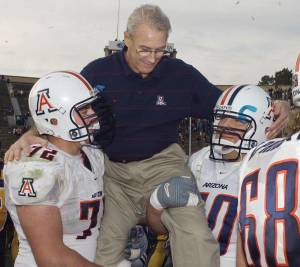 the mid-1970s. Mackovic’s Wildcats went 10-18 over three seasons and never contended in the Pacific-10 Conference. It ended badly, with players accusing him of maltreatment, going to the university president and getting him canned in mid-season. Few college football mutinies have been so ugly. After that, Mackovic was essentially unhirable and stepped away from the game.
the mid-1970s. Mackovic’s Wildcats went 10-18 over three seasons and never contended in the Pacific-10 Conference. It ended badly, with players accusing him of maltreatment, going to the university president and getting him canned in mid-season. Few college football mutinies have been so ugly. After that, Mackovic was essentially unhirable and stepped away from the game.
Still in good health at age 75, he lives with his wife Phyllis near Palm Springs, California.

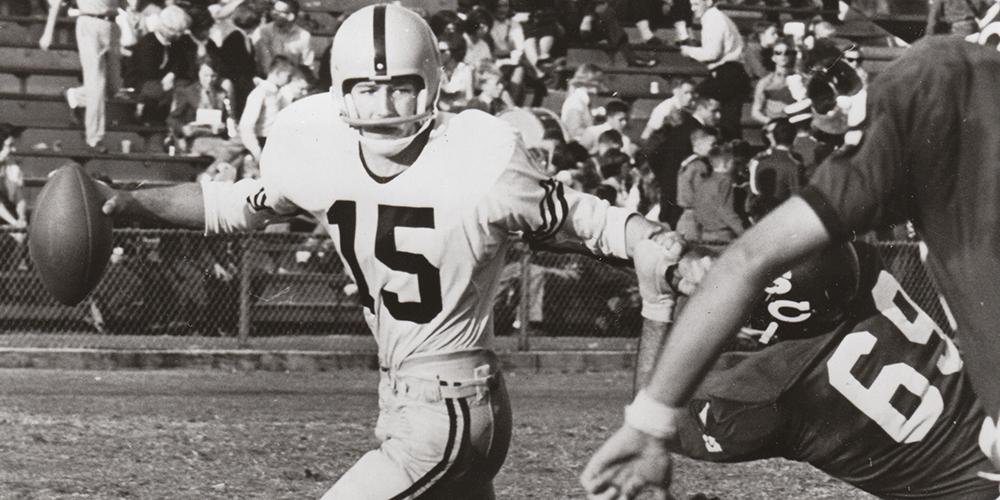
8 Comments
Richard:
Great recap on a man’s life that obviously impacted so many men on teams, staff, reporters like yourself, fans, and relatives of all those I mentioned.
He took the mantle he was given, that of making a difference in the lives of those he was around.
That’s my goal in life.
You certainly do that, have done that and continue to do it it with the various initiatives that you start.
You too will one day be remembered with accolades of human kindness, information exchange, opinions that help lead and provide vision and a clear voice of reason.
Great job.
Gary, I think John Mackovic was a leader starting way back in Barberton. He worked in a super-competitive field and won more than he lost (as a coach…those years as a Wake Forest player must have been tough). Thanks also for your kind words…I hope they are true!
Thanks, Richard. I had heard of Macovic, but knew little about him. What a great coaching career he had! And nice ti hear he is still living well.
Kevin–yes, he had quite a career as player and coach. Never reached the mountaintop, but he was in a very competitive field.
He has a great offensive mind and superior instinct for the game. However, the John Mackovic that I had an encounter with was totally different. He was an arrogant, self-serving, nasty son of a bitch. He lacks empathy and true concern for his players ( Kansas City Chiefs, Arizona, and Wake Forest). He ruined any chance of my professional aspirations by poor mouthing me to NFL scouts and by attempting to void my scholarship. I didn’t like him then, and I owe him a past due ass whipping now.
You sound like you are related to Kewan Platt. Are you? Anyway, Mackovic also coached at the University of Texas.
Derek Crocker-CB, WFU,’76-’81.
Coach Mackovic was a great offensive coach who started me at receiver but destroyed me mentally. It was only due to asst coach Archie Strimmel that allowed me to move to corner and regain starter position. Coach Mackovic was good for WFU at the time but had difficulty with communicating with the young black football scholarship athlete!
How did he “destroy” you if you were able to remain a contributing member of the Wake Forest football team? Did he communicate better with White players than with black ones?
Add Comment